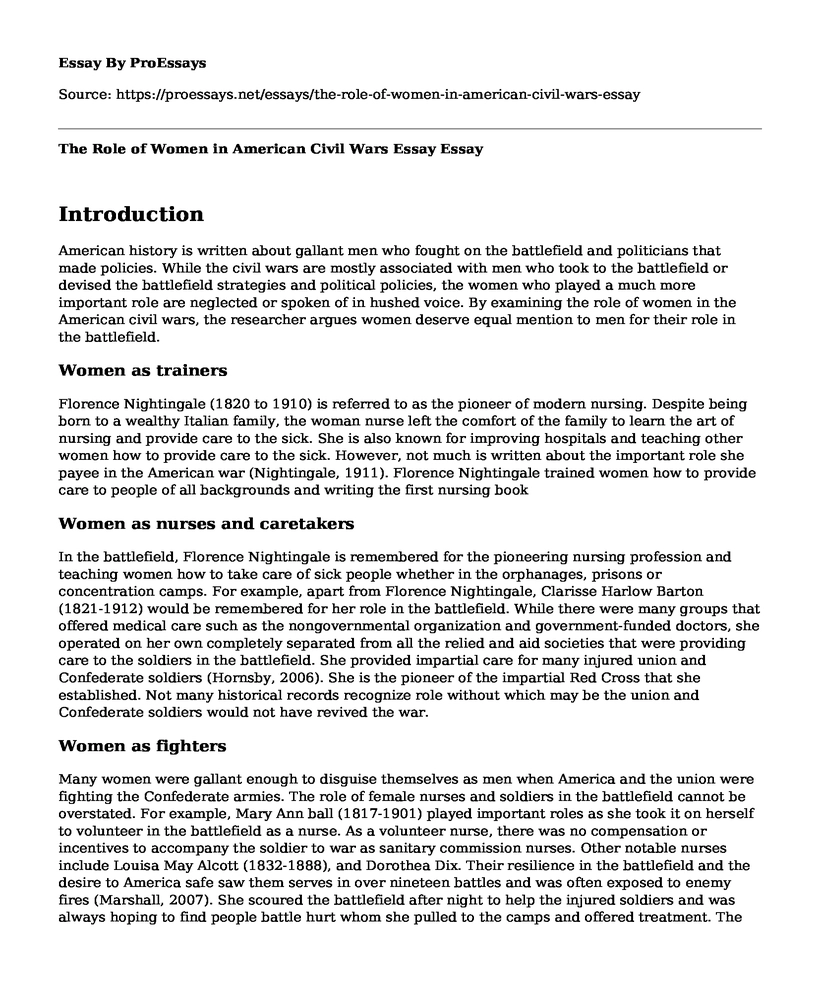Introduction
American history is written about gallant men who fought on the battlefield and politicians that made policies. While the civil wars are mostly associated with men who took to the battlefield or devised the battlefield strategies and political policies, the women who played a much more important role are neglected or spoken of in hushed voice. By examining the role of women in the American civil wars, the researcher argues women deserve equal mention to men for their role in the battlefield.
Women as trainers
Florence Nightingale (1820 to 1910) is referred to as the pioneer of modern nursing. Despite being born to a wealthy Italian family, the woman nurse left the comfort of the family to learn the art of nursing and provide care to the sick. She is also known for improving hospitals and teaching other women how to provide care to the sick. However, not much is written about the important role she payee in the American war (Nightingale, 1911). Florence Nightingale trained women how to provide care to people of all backgrounds and writing the first nursing book
Women as nurses and caretakers
In the battlefield, Florence Nightingale is remembered for the pioneering nursing profession and teaching women how to take care of sick people whether in the orphanages, prisons or concentration camps. For example, apart from Florence Nightingale, Clarisse Harlow Barton (1821-1912) would be remembered for her role in the battlefield. While there were many groups that offered medical care such as the nongovernmental organization and government-funded doctors, she operated on her own completely separated from all the relied and aid societies that were providing care to the soldiers in the battlefield. She provided impartial care for many injured union and Confederate soldiers (Hornsby, 2006). She is the pioneer of the impartial Red Cross that she established. Not many historical records recognize role without which may be the union and Confederate soldiers would not have revived the war.
Women as fighters
Many women were gallant enough to disguise themselves as men when America and the union were fighting the Confederate armies. The role of female nurses and soldiers in the battlefield cannot be overstated. For example, Mary Ann ball (1817-1901) played important roles as she took it on herself to volunteer in the battlefield as a nurse. As a volunteer nurse, there was no compensation or incentives to accompany the soldier to war as sanitary commission nurses. Other notable nurses include Louisa May Alcott (1832-1888), and Dorothea Dix. Their resilience in the battlefield and the desire to America safe saw them serves in over nineteen battles and was often exposed to enemy fires (Marshall, 2007). She scoured the battlefield after night to help the injured soldiers and was always hoping to find people battle hurt whom she pulled to the camps and offered treatment. The policy maker and politicians would have left the badly hurt soldiers on the battlefield but she helped them either get back to the battlefield after treatment or go home to third families
Women as mobilize
Women mobilize other women and men to care for injured soldiers and influenced their husbands and sons to go to the battlefield, there were many women who participated in women's suffrage, anti-discrimination campaign and another form of activities that saw the American civil war end after the goals were met.
Conclusion
American civil wars were not only about men in politics and at the battlefront, but also the women who either volunteered to help provide care to the sick and injured men in the battlefield. May be America would be badly hit had the women not been there. Their hidden and often forgotten role in the American civil wars deserves special mention in history books in relations to making America great today.
References
Hornsby, A. (2006). Masterful Women: Slaveholding Widows from the American Revolution through the Civil War (review). Civil War History, 52(4), 430-432. doi: 10.1353/cwh.2006.0080
Marshall, A. (2007). The Essence of Liberty: Free Black Women during the Slave Era, and: Women on the Civil War Battle Front (review). Civil War History, 53(2), 214-215. doi: 10.1353/cwh.2007.0038
Marshall, A. (2007). The Essence of Liberty: Free Black Women during the Slave Era, and: Women on the Civil War Battle Front (review). Civil War History, 53(2), 214-215. doi: 10.1353/cwh.2007.0038
Nightingale, F. (1911). Florence Nightingale's Letter of Advice to Bellevue. The American Journal Of Nursing, 11(5), 361. doi: 10.2307/3404989
Cite this page
The Role of Women in American Civil Wars Essay. (2022, May 17). Retrieved from https://proessays.net/essays/the-role-of-women-in-american-civil-wars-essay
If you are the original author of this essay and no longer wish to have it published on the ProEssays website, please click below to request its removal:
- Research Paper on The Berlin Wall
- An Essay Defending Roosevelt's View of Commitment in His Fourth Inaugural Speech
- The Connection Between War and Drug Addiction: Essay Sample
- David Koresh Biography
- Essay Sample on Parenting Styles on Developmental Outcomes
- Essay Sample on Women in Ministry: Examining the Barriers to Ordination
- Essay Sample on Responsive Relationships: A Foundation for Decent Families







